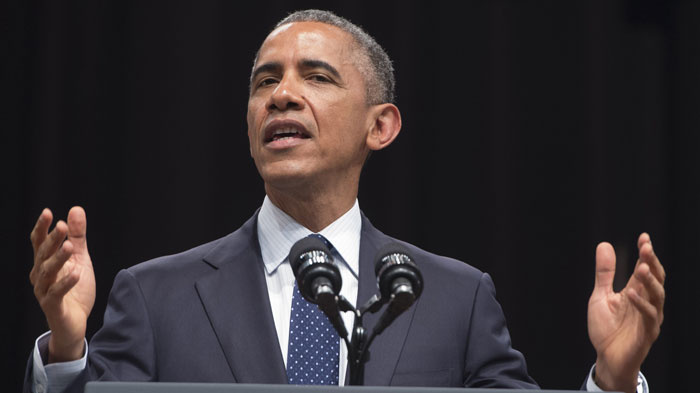After Criticisms, Obama Speaks Out on Killings of Muslims in N.C.

Following the FBI’s decision to investigate the deadly shootings of three Muslim students in North Carolina, President Barack Obama spoke out against religious discrimination in a statement on Friday.
“No one in the United States of America should ever be targeted because of who they are, what they look like, or how they worship,” the president said. “The FBI is taking steps to determine whether federal laws were violated.”
The remarks come after Muslim leaders across the United States denounced the Feb. 10 murders in Chapel Hill and the Obama administration received mounting criticism for not speaking out more forcefully about the situation.
Speaking alongside Mexican President Enrique Peña Nieto in Mexico City Thursday, Turkish President Recep Tayyip Erdogan said the silence of President Barack Obama, Vice President Joe Biden, and Secretary of State John Kerry was “telling.”
“If you stay silent when faced with an incident like this and don’t make a statement, the world will stay silent toward you,” Erdogan said, condemning Craig Stephen Hicks, 46, who was arrested for the crimes. “I ask Mr. Obama, where are you, Mr. President?
Hicks has been charged with the murder of Deah Barakat, 23, a University of North Carolina dental student, his wife, Yusor Mohammad Abu-Salha, 21, and her sister, Razan Mohammad Abu-Salha, 19, a student at North Carolina State University. Local police say the shooting was a result of a parking dispute. The FBI is looking into whether Hicks killed the three because they were Muslims (the women wore headscarves), which is a hate crime. Hicks, who turned himself in, is a self-proclaimed atheist who expressed anti-religious views on his Facebook page.
“This was not a dispute over a parking space; this was a hate crime. This man had picked on my daughter and her husband a couple of times before, and he talked with them with his gun in his belt. And they were uncomfortable with him, but they did not know he would go this far,” Dr. Mohammad Abu-Salha, father of the sisters, said Feb. 11.
The murders prompted an outpouring of emotion on the University of North Carolina campus, and in nearby Raleigh, where thousands gathered to mourn the deaths. Grief over their killing spread across the nation over the course of the week. Dozens of vigils have been held, with more planned across the country. According to a Facebook page set up by the families of the victims, there will also be a vigil at the Al-Aqsa mosque in Jerusalem, the third-most sacred site in Islam.
In his remarks, Obama said the “overwhelming presence at the funeral” served to reminder the country that “We are all one American family.” He described the killings as “brutal and outrageous.”
The tragic killings have sparked a debate over how the murders are being treated by law enforcement and the media. Using the hashtag #muslimlivesmatter and #chapelhillshooting, people from around the world alleged the deaths would be treated as an act of terrorism if the shooter had been Muslim and the victims white.
“Why deaths of muslims are not noticed in a terrorist incident? They are humans too!” tweeted @shahzad2404 from Pakistan.
Omid Safi, director of Duke University’s Islamic Studies Center, compared the murders to the killing of Emmett Till, a crime that galvanized the African-American civil rights movement in the 1950s.
“In some ways, this vile and heinous crime is the strange fruit of 15 years of the demonization of Islam and Muslims from the most public airwaves in this country,” Safi wrote. “It’s a vicious combination: repeated dehumanization of Muslims and association of Islam with the worst of violence on one hand, and the sad reality of America being a nation with 300 million guns for 300 million people.”
Obama ended his remarks by quoting one of the victims, Yusor Mohammad Abu-Salha.
“Growing up in America has been such a blessing,” Yusor said in a recording made last summer. “It doesn’t matter where you come from. There’s so many different people from so many different places, of different backgrounds and religions — but here, we’re all one.”
Source: FP

